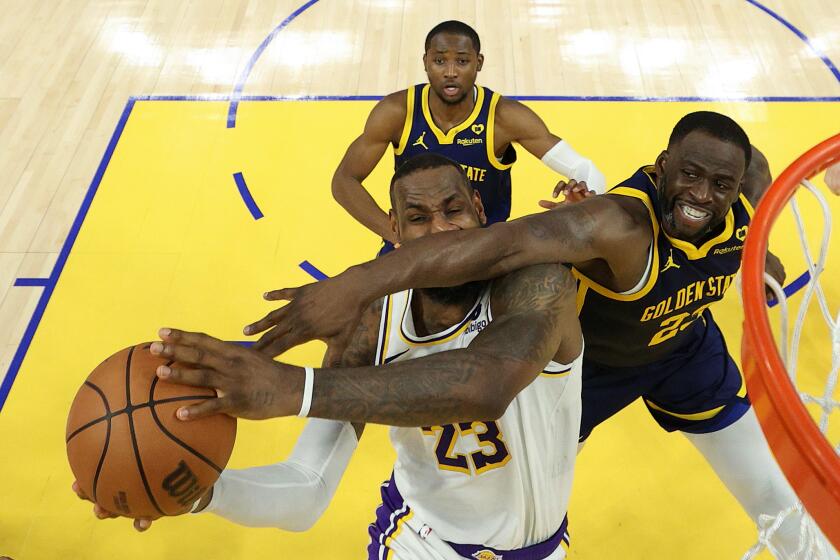Music’s Malaise Spreads: Tower Records Hits Bottom
Less than a decade ago, Russ Solomon was listed by Forbes Magazine as one of America’s richest men. Starting as a teenager selling records from his father’s drugstore, he rode the nation’s passion for music by pioneering the first music megastore, Tower Records.
On Monday, the company that brought him so much wealth filed for bankruptcy protection -- a high-profile casualty of the market forces that have undermined the music industry in recent years.
The reorganization under Chapter 11 is expected to be a shudder, not a shuttering; the chain of 93 U.S. stores will continue to stay open for now, including the company’s famed location on the Sunset Strip.
But for the music industry, already accustomed to bleak corporate news and a three-year swoon of bad financial signs, this most recent dispatch hit many music fans especially hard. To them, it seemed personal.
For recent generations of dedicated and discerning music collectors, the Tower name is the rare corporate marquee that engenders affection and respect.
“It’s a touchstone. It represents community and even a sense of integrity,” said Grammy-winning music producer Rick Rubin, using terms applied more often to beloved indie radio stations or rock bands.
Tower is just the latest major music retailer to fall on hard times from an array of causes.
The pressure has been mounting since such deep discounters as Best Buy Co., Target Corp. and Wal-Mart Stores Inc. began elbowing their way into the music business a decade ago, offering low-priced CDs.
At the same time, sales have plunged amid widespread illegal downloading of music from the Internet and other forms of piracy.
During the late 1990s, the five major record labels helped bail out Tower and other chains by creating a policy to withhold advertising dollars from the deep discounters if they sold CDs below the labels’ suggested prices. That deal was quashed in 2000 by federal antitrust regulators. Several state attorneys general also sued the major labels and music retailers, contending that the pact was keeping CD prices inflated. The record companies and three retailers agreed to a $143-million settlement.
When the subsidies vanished, the retailers became even more vulnerable. Although most tried to reduce the impact by bulking up on DVDs, video games, offbeat toys and other merchandise, the damage was done.
Wherehouse Entertainment filed for bankruptcy last year for the second time in eight years, and has closed scores of stores. The ailing, mall-based Sam Goody also has been forced to close numerous stores. It was bought by Best Buy for $685 million in 2000, and turned over last year to investment firm Sun Capital Partners Inc. in exchange for assuming the money-losing chain’s debts and liabilities.
Tower’s financial problems are more poignant because of the chain’s long links to the music industry and its family ownership. Under the company’s prepackaged reorganization plan filed Monday in Delaware, the Solomon family would be forced to relinquish all but 15% of the Sacramento-based company, which was founded in 1960. Investors who own company bonds will receive a collective 85% stake in the company.
Tower officials said they expected to emerge from Chapter 11 within 60 days.
“Court approval of the prepackaged plan will reduce existing debt by $80 million, effectively eliminating the financial risks that have faced Tower for the past three years,” Chief Executive Officer E. Allen Rodriguez said in a statement. “Our issues are financial, not operational.”
Analysts have said, however, that Tower may have contributed to its decline. In the late 1990s, when CD sales were soaring, the company launched a major expansion, selling $110 million in bonds to open more U.S. stores and establish a bigger presence in the book world.
Soon after, the market began to unravel with the emergence of Napster, the revolutionary file-swapping network that allowed millions of music fans to trade songs online for free. As sales plunged, Tower struggled to pay its debts.
Tower’s parent tried to sell the company nearly a year ago after it defaulted on a $5.2-million payment, but there were no takers.
Analysts say the bankruptcy and reorganization plan are, in essence, another step in an eventual sale. By erasing its debts in Bankruptcy Court, experts said, Tower would become more attractive. Still, any buyer would face a troubled retail landscape, with no clear indication of when -- or whether -- CD sales will stop falling.
“The real game is to develop a competitive auction where the buyers get caught up in the excitement,” Los Angeles bankruptcy attorney Martin Zohn said. “Everyone loves a bargain, and the filing helps that.”
Music industry sources who have been discussing the bankruptcy filing with Tower say the company expects to close at most a handful of stores in the immediate future. In the long run, however, a new buyer could decide to close many more.
Such a fate would be a stunning reversal of a strategy that created one of the nation’s biggest and most recognizable record outlets.
Tower was a pioneer of the megastore, and the pure volume of its inventory at its multilevel stores was a dizzying smorgasbord for music fans. More than that, the stores’ staff members were selected for their passion and knowledge, distinguishing the outlets from most mall-based music merchants.
Tower’s late-night hours, in-store concerts and bookstore approach to encouraging browsing turned some of the outlets into destinations.
Music producer Rubin said he made weekly trips to the store on Sunset Boulevard. When his friend, comedian Chris Rock, comes to town, the two cruise through the aisles of rap music to find the newest sounds. Rubin said he invariably ran into a musician or music executive, be it the singer Beck or Interscope Records chief Jimmy Iovine.
“Tower Records, that’s where the Strip begins, and it ends with the Rainbow [Room],” said Rubin, one of the founding figures of Def Jam Records, known for his work with artists as diverse as the Beastie Boys, Johnny Cash and the Red Hot Chili Peppers. “If you came from out of town, that’s where you went to get the rock ‘n’ roll scene.”
Jim Guerinot, the manager for hit bands Offspring and No Doubt, said walking into a Tower for the first time was an affirmation of the importance of music for fans. It held the promise of a giddy safari through bins of esoteric imports and scarcely heard cult heroes.
“I’m in the music business, so when record chains are in trouble, it’s bad for the business,” Guerinot said Monday. “But if Tower is in trouble, that’s bad for me.”
On Monday, the talk in the store on the Strip was gloomy and nostalgic.
Jeff Quimby, who walked out with Audioslave’s self-titled debut CD, called the famed outlet “a classic.” But he lamented that file swapping had eroded the prospects for its survival. Free downloading, he said, “is hurting the industry. It’s hurting these guys. It’s out of hand now.”
Billy Gamble, a traveling sales executive who stopped off to pick up two CD imports, said the store also was confronting competition from legal online music sources. He said he’d been buying more albums from websites such as Amazon.com. “It’s too bad,” Gamble said of Tower’s predicament. “Hopefully they’ll be all right.”
*
(BEGIN TEXT OF INFOBOX)
Tower’s record
A history of the venerable Tower Records music chain, which has filed for Chapter 11 bankruptcy protection:
* 1940s: Sacramento’s Russell Solomon begins selling records in his father’s drugstore; his first record sales venture in the 1950s fails in 1960.
* 1968: Two Tower record stores in Sacramento do so well that a megastore concept is tried in San Francisco, duplicating the supermarket approach of overwhelming the customer with choices. Record albums are piled on the floor, forcing customers to step over them.
* 1972: Tower’s Sunset Strip store opens.
* 1970s: The Sunset Strip outlet becomes the professionals’ music store: It is up the street from many record company offices, down the street from the “rock hotel” -- the Continental Hyatt House -- and around the corner from the Whisky a Go-Go nightclub.
* 1974: The Sunset Strip store is the largest record store in the world, according to the Guinness Book of Records.
* 1980: The chain has 28 record shops, six bookstores and 12 poster
stores.
* July 1983: Tower Records opens its 33rd store, a 25,000-square-foot location in New York’s East Village, calling it the world’s largest record store. Ads in New York newspapers carry a note in small type that reads: “Suburban Locations: San Francisco, Los Angeles, Seattle, Honolulu, Phoenix, San Diego, Portland, Sacramento, Las Vegas, Mexico City, Tokyo, Sapporo and Elsewhere.”
* April 1987: Most of the chain’s 75 music and video stores participate in a three-week project that unites the chain with Amnesty International, which shows videos designed to persuade customers to fill out postcards aimed at freeing political prisoners.
* 1994: Tower opens its first multimedia store, offering books, videos, records and CD-ROMs.
* 1998: Tower owner MTS sells $110 million in bonds to raise money for expansion, and Chairman Russell Solomon passes his title to son Michael.
* 2000: To counteract growing losses, Tower begins several experiments, including the addition of digital downloading kiosks that allow customers to download songs and burn their own CDs. A similar project allows customers to pay for music from Tower’s website and then download it.
* 2001: MTS adopts a restructuring plan that includes closing and liquidating most of Tower’s stand-alone and combination bookstores and selling the company’s operations in Argentina, Hong Kong, Singapore and Taiwan and converting them to franchises. It also decides to shut down its operations in Canada.
* 2003: As a way of addressing the growing digital music distribution market, Tower helps found Echo, a joint venture by Best Buy, Trans World Entertainment, Virgin Entertainment and Wherehouse Music. The consortium’s goal is to devise a technology and licensing platform for the delivery of digital music to its retail members.
* Feb. 9, 2004: MTS files for bankruptcy protection.
Sources: Hoover’s, Times research
More to Read
The biggest entertainment stories
Get our big stories about Hollywood, film, television, music, arts, culture and more right in your inbox as soon as they publish.
You may occasionally receive promotional content from the Los Angeles Times.






